Travel by Novel: Austria and Vienna

Best Historical Novels for
Travelers to Austria and Vienna
Jump to:
Prehistoric Austria
Medieval Austria
Austria in the Sixteenth Century
Seventeenth-Century Austrians
Austria during the 18th Century and the Napoleonic Wars
Austria and Vienna in the Nineteenth Century
Twentieth Century Austria and Vienna before the World Wars
The Austro-Hungarian Empire and World War I
World War II Austria
Vienna in the 1950s and 1960s
For Teens and Preteens

Austria and its capital city, Vienna, are renowned for their cultural sophistication. This is the land of music-makers Mozart, Beethoven, Schubert, Strauss and Mahler. It's also where Gustav Klimt and his fellow artists of the "Vienna Secession" rebelled against conservative artistic traditions, creating exuberant new art that heralded the twentieth century.
Vienna is known for its large and opulent palaces where Hapsburg archdukes lived in grand style, and on a smaller scale for its culinary specialties, like wienerschnitzel, sachertorte and black coffee piled high with whipped cream.
The Roman name for Vienna, Vindobona, is Celtic, suggesting the city's origins date back even earlier than the first-century settlement that grew up around a Roman military camp. Austria got its start in 976 when the Holy Roman Emperor Otto II named a member of the Babenberg family, Leopold I, margrave of the territory. A descendent, Duke Leopold V, caused a stir by capturing King Richard the Lionheart of England as he was returning from the Third Crusade, and holding him secretly in Dürnstein Castle until Richard was finally located and ransomed.
Perhaps the most illustrious Austrians were the Hapsburgs, who established themselves as rulers in Vienna beginning in the thirteenth century, and served as Holy Roman Emperors from the fifteenth century until defeated by Napoleon in the early 1800s. The Hapsburgs clung to power as rulers of Austria-Hungary until World War I.
Prehistoric Austria
Click on the title for more information from Powell's Books or another online source.
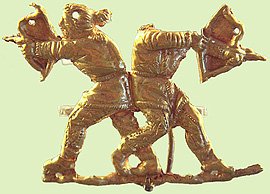
Morgan Llywelyn, The Horse Goddess (1982), about a Celtic woman living in a salt-mining village (today's Hallstatt, Austria), who has a special gift for communicating with horses and runs away with a nomadic Scythian chieftain during the eighth century B.C.
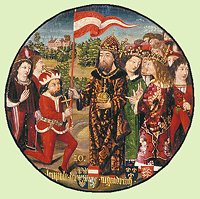
Medieval Austria
Click on the title for more information from Powell's Books or another online source.
Gore Vidal, A Search for the King (1950), about the minstrel Blondel's search for Richard the Lionheart after the latter is captured and imprisoned by Leopold V of Austria while returning from the Crusades.
(1950), about the minstrel Blondel's search for Richard the Lionheart after the latter is captured and imprisoned by Leopold V of Austria while returning from the Crusades.
Click on the title for more information from Powell's Books or another online source.
José Saramago, The Elephant's Journey (2010), about the travels of a group taking an elephant from Portugal to Austria as a wedding present to Archduke Maximilian in 1551. Review
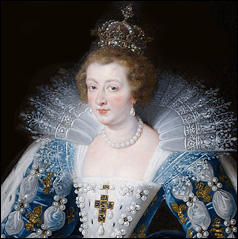
Seventeenth-Century Austrians
Click on the title for more information from Powell's Books or another online source.
Evelyn Anthony, Anne of Austria (1968), a biographical novel about Anne of Austria, the wife of the French king Louis XIII and mother of Louis XIV.
(1968), a biographical novel about Anne of Austria, the wife of the French king Louis XIII and mother of Louis XIV.
Austria during the Eighteenth Century and the Napoleonic Wars
Click on the title for more information from Powell's Books or another online source.
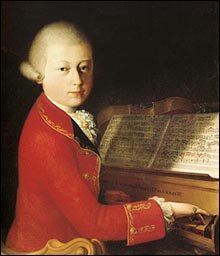 Aileen Armitage, A Double Sacrifice
Aileen Armitage, A Double Sacrifice (2001 reissue; originally published 1975 as Empress to the Eagle
(2001 reissue; originally published 1975 as Empress to the Eagle under the pen name Aileen Quigley), about Napoleon Bonaparte's second empress, Marie Louise, the daughter of the Austrian emperor.
under the pen name Aileen Quigley), about Napoleon Bonaparte's second empress, Marie Louise, the daughter of the Austrian emperor.
Armand Cabasson, Wolf Hunt (2008), a thriller about a French officer investigating a murder while Napoleon's army is in Austria; #2 in the Quentin Margont mystery series.
Michele Halberstadt, The Pianist in the Dark (2011), about a blind pianist, the daughter of the Empress of Austria's secretary, who discovers love after Franz-Anton Mesmer tries to restore her sight with his experimental new technique.
Richard Harvell, The Bells (2010), about a Swiss boy with a remarkable voice who joins a choir in Vienna, where he is forced to become a castrato and falls in love with a beautiful, crippled girl.
Naomi Jacob, The Irish Boy (1955), a biographical novel about the eighteenth century Irish tenor Michael Kelly, whose singing career took him to Italy and Austria.
(1955), a biographical novel about the eighteenth century Irish tenor Michael Kelly, whose singing career took him to Italy and Austria.
David Weiss, Sacred and Profane (1968), a biographical novel about the Austrian composer Wolfgang Amadeus Mozart.
(1968), a biographical novel about the Austrian composer Wolfgang Amadeus Mozart.
David Weiss, The Assassination of Mozart (1970), a novel about Mozart based on the theory that he was poisoned by his rival composer Salieri; sequel to Sacred and Profane.
(1970), a novel about Mozart based on the theory that he was poisoned by his rival composer Salieri; sequel to Sacred and Profane.
Austria and Vienna in the Nineteenth Century
Click on the title for more information from Powell's Books or another online source.
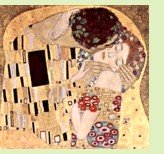 Selden Edwards, The Little Book, about a California man who suddenly finds himself transported from 1988 San Francisco to 1897 Vienna.
Selden Edwards, The Little Book, about a California man who suddenly finds himself transported from 1988 San Francisco to 1897 Vienna.
Teresa Grant, Vienna Waltz (2011), a mystery about a diplomat's wife in Vienna with her husband during the negotiations following Napoleon's defeat who is summoned to a Russian princess's rooms where she finds her husband with the princess's bloody corpse.
Elizabeth Hickey, The Painted Kiss (2005), about a student of the controversial Viennese artist Gustav Klimt and the romantic relationship that develops between them.
J. Sydney Jones, The Empty Mirror (2009), a mystery about an 1898 hunt for a serial killer in Vienna who has murdered a woman who modeled for Gustav Klimt, leading the police to suspect the artist of the crimes; #1 in the Karl Werthen series. Review
J. Sydney Jones, Requiem in Vienna (2010), a mystery about an 1899 investigation into a series of fatal and potentially fatal "accidents" plaguing composer Gustav Mahler; #2 in the Karl Werthen series. Review or Author Interview
Nicholas Meyer, The Seven-Per-Cent Solution (1974), a mystery that imagines what might have happened if Sherlock Holmes and Sigmund Freud had collaborated on an investigation.
(1974), a mystery that imagines what might have happened if Sherlock Holmes and Sigmund Freud had collaborated on an investigation.
Joseph Roth, The Radetzky March (1932), about three generations of an Austrian family after one of them saves the life of Emperor Franz Josef on the battlefield in 1859 and is ennobled on the spot.
Joseph Skibell, A Curable Romantic (2010), a humorous literary novel about a man who falls in love with one of Freud's patients. Review
Twentieth Century Austria and Vienna before the World Wars
Click on the title for more information from Powell's Books or another online source.
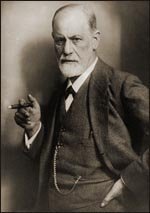
Rosina Lippi, Homestead (1999), about the lives of women in an Austrian village from 1907 to 1977.
Robert Musil, The Man Without Qualities (originally published in German in three volumes, 1930-1942), an intellectual novel about the Austro-Hungarian Empire before the First World War; about events during the author's lifetime, so technically not historical fiction.
Jed Rubenfeld, The Death Instinct (2010), a thriller about a New York police detective in search of the terrorists who set off a bomb on Wall Street in 1920, a mission which takes him to visit Freud in Vienna; sequel to The Interpretation of Murder.
Jody Shields, The Fig Eater (2001), a mystery about a woman found strangled in a Vienna park in 1910 and the different people trying to find out who killed her; loosely based on Freud's case study of "Dora."
Frank Tallis, A Death in Vienna (titled Mortal Mischief in the U.K.) (2005), about a Viennese psychoanalyst and disciple of Freud who helps his detective friend investigate the death of a beautiful medium in 1902; #1 in the Liebermann Papers mystery series.
Frank Tallis, Vienna Blood (2006), about a Viennese psychoanalyst and disciple of Freud who helps his detective friend find a serial killer; #2 in the Liebermann Papers mystery series.
Frank Tallis, Fatal Lies (2008), about a Viennese psychoanalyst and disciple of Freud who helps his detective friend investigate the sadistic murder of a young cadet in a military school; #3 in the Liebermann Papers mystery series.
Frank Tallis, Darkness Rising (2009); about a Viennese psychoanalyst and disciple of Freud who helps his detective friend investigate the murders of a monk and a city official that are being blamed on Vienna's Jews; #4 in the Liebermann Papers mystery series.
Frank Tallis, Vienna Twilight (2010; titled Deadly Communion in the U.K.), about a Viennese psychoanalyst and his detective friend trying to solve a series of murders of young women by a killer who uses a hatpin; #5 in the Liebermann Papers mystery series. Review at Eurocrime
G.G. Vandagriff, The Last Waltz (2009), about a Viennese woman's search for love before, during and between the world wars. Review and Author Interview
The Austro-Hungarian Empire and World War I
Click on the title for more information from Powell's Books or another online source.
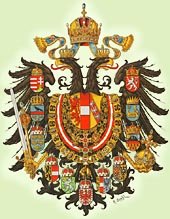
John Biggins, A Sailor of Austria: In Which, Without Really Intending To, Otto Prohaska Becomes Official War Hero No. 27 of the Habsburg Empire (1991), a comic novel about U-boat crews during the waning of the Austro-Hungarian Empire; #1 in the Otto Prohaska series.
John Biggins, The Emperor’s Coloured Coat: In Which Otto Prohaska, Future Hero of the Habsburg Empire, Has an Unexpectedly Interesting Time While Not Quite Managing to Avert the First World War (1992), a comic novel set in the last years of the Austro-Hungarian Empire; #2 in the Otto Prohaska series.
John Biggins, Two-Headed Eagle: In Which Otto Prohaska Takes a Break as the Habsburg Empire's Leading U-Boat Ace and Does Something Even More Thankless (1993), a comic novel about a soldier during the last years of the Austro-Hungarian Empire; #3 in the Otto Prohaska series.
John Biggins, Tomorrow the World: Tomorrow the World: In Which Cadet Otto Prohaska Carries the Habsburg Empire's Civilizing Mission to the Entirely Unreceptive Peoples of Africa (1994), a comic novel about a soldier’s early days fighting in the Austro-Hungarian army; #4 in the Otto Prohaska series.
World War II Austria
Click on the title for more information from Powell's Books or another online source.
Sarah Gainham, Night Falls on the City (1967), about a non-Jewish actress hiding her Jewish husband from the Nazis in German-occupied Vienna; written about events within the author's lifetime, so technically not historical fiction.
(1967), about a non-Jewish actress hiding her Jewish husband from the Nazis in German-occupied Vienna; written about events within the author's lifetime, so technically not historical fiction.
Charlotte Hardy, Meg (2007), about a woman who discovers a painting that belonged to her dead mother which tells the story of her 1938 love affair with an Austrian intellectual.
Vienna in the 1950s and 1960s
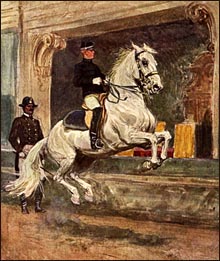
Click on the title for more information from Powell's Books or another online source.
John Irving, Setting Free the Bears (1968), about two Viennese students in 1967 who decide to liberate the animals in the Vienna Zoo; a contemporary novel when written.
Mary Stewart, Airs Above the Ground (1965), romantic suspense about a young married woman who goes to Austria in search of her missing husband and encounters a mystery revolving around the famed Lipizzaner stallions; a contemporary novel when written.
For Teens and Preteens

Click on the title for more information from Powell's Books or another online source.
Susanne Dunlap, The Musician’s Daughter (2010), about a girl in Vienna and her efforts to find out who killed her father, a famous violinist, and stole his valuable violin.
Marguerite Henry, White Stallion of Lipizza (1964), about a boy who longs to work with the magnificent Lipizzan show stallions but is told he can't because he is just a baker's son. Recommended for ages 9-12.
(1964), about a boy who longs to work with the magnificent Lipizzan show stallions but is told he can't because he is just a baker's son. Recommended for ages 9-12.
Top of Page
Back to Travel by Novel Directory
Enjoy this page? Please pay it forward. Here's how...
Would you prefer to share this page with others by linking to it?
- Click on the HTML link code below.
- Copy and paste it, adding a note of your own, into your blog, a Web page, forums, a blog comment, your Facebook account, or anywhere that someone would find this page valuable.